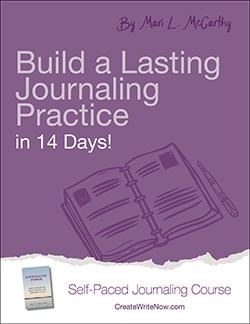
1. Always journal the right way.
There is only one right way to journal, and that’s your way. Whether you do it in the morning, or a couple of times a week, whether you just do it to dump the stress, get reenergized or to figure out how to become more productive, whatever the reason, the what and how is your personal choice. Always.
2. Journal the old-fashioned way, with pen and paper.
It is the pen and notebook type of journaling that Journaling for the Health of It™ is all about. There is something organic and something natural about it. There is something about the connection of your hand to the pen to the page that enables you to get into more of who you are. You don’t get that when you are using computers or other electronic devices.
3. Keep your journal simple.
In terms of what kind of journal you use, I’d recommend a notebook around your house or one that you can pick up at CVS or Staples. I think that we’re prone to buying a beautiful, expensive journal and then waiting for the absolutely perfect opportunity to use it. Then you’ll find yourself saying, “Ohh yeah, I bought this beautiful journal about 3 or 4 years ago and I have been meaning to get to it, but….” Simple and inexpensive is best.
4. Note the change in yourself.
If you journal daily or fairly routinely, I would say that within two to three weeks you’re going to notice a change in yourself. With my clients whom I meet with face-to-face, it’s so exciting to see the change in their faces, with fewer wrinkles, or just hear the difference in their voices. It’s not breathy anymore; it’s more grounded and real. It’s very exciting to see those changes. Keep an eye out for even the smallest of changes and document them in your journal.
5. The times when you least feel like journaling are the times when you need it most.
Some of the common issues people have are with stress, energy, and productivity. When you find yourself stressed, unproductive, or frustrated, do a big data dump with your journal. Ask it a question. Have a dialogue with it. When you’re sluggish and the last thing in the world you feel like doing is attaching yourself to the page, that is a perfect opportunity to find out what’s really going on inside!
6. No one will grade your journal writing, so ignore your inner critics.
A big barrier to journaling is fear. Our inner critics tell us that we’re not writers, and we have to dot our t’s and cross our i’s like we did in school. So, when the opportunity to write presents itself, we just automatically shut down. That’s why I recommend the Ten-Minute Missive which is inspired by Julia Cameron’s Morning Pages. You start with something like “Today I feel…” and write in stream of consciousness for ten minutes. You can even do five to get started. You can trash it later, if you like.
7. If you don’t know how to find the time to write, ask your journal for advice.
We have to get into a habit of making time for ourselves. Sometimes even five or ten minutes seems like too much, which is silly if you think about it. Take a few breaths and say okay, this is what I really want to do and I really want to have journaling as a part of my life and my health improvement process. If you need help making time, use your journal to find the answer. Write the question, “How can I find the time to journal?” and do a page or Ten-Minute Missive, and you’ll come up with the answer. We have the answers inside of ourselves. We think that we don’t, but we really do.
This post was adapted from “The Write Way to Wellness," an interview with Chris Vasiliadis on Blog Talk Radio.
Do you find yourself dwelling on missed opportunities? Or perhaps you're having trouble making sense of it all? Please download our free ebook, CreateWriteNow's Expert Guide to Therapeutic Journaling, shows you journaling can provide the tools you need to achieve the happiness we all deserve.
Are you new to journaling? Or are you an experienced journaler who wishes to restart a daily journaling practice? Our Build a Lasting Journaling Practice in 14 Days self-paced course can help.



Leave Comment